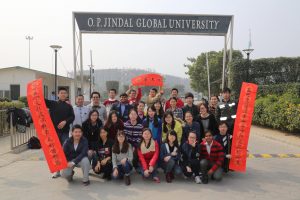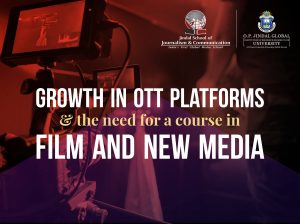Robert Redford and Dustin Hoffman starrer, ‘All the President’s Men’ tells the story of two reporters whose investigation of the Watergate scandal ultimately forced US President Richard Nixon to resign. He was once again at the centre of the movie ‘Frost/Nixon’, which highlighted another form of courageous journalism—interviews. Add to the list ensemble cast drama ‘Spotlight’ and ‘The Post’, among others—and there are many popular representations of journalists who are the true heroes of their stories.
George Orwell famously said, “Journalism is printing what someone else does not want to be printed; everything else is public relations.” There are times when we ponder if the Orwellian world is our reality today. In times like these, we need the courage and bravery of journalists to present us with the real picture. All eyes are set on the top universities in India and around the world to nurture the brave journalists of the future.
If you see yourself breaking stories in front of the camera or are driven by the idea of investigative journalism, then a media course from a top university can help you achieve your career goals. QS World University Rankings 2021 ranked O.P. Jindal Global University (JGU) as the number one private university in the country. JGU offers a cutting-edge programme for aspiring journalists, with a heavy focus on real-world experience and exposure, to ensure you’re ready to meet the opportunities and challenges of the working world.
The B.A. (Hons.) in Journalism & Media Studies programme offered by Jindal School of Journalism and Communication (JSJC) endeavours to create courageous professionals for the “golden age of journalism” as the school’s Dean, Professor Tom Goldstein puts it. He believes that through the programme, “Students will learn substance as well as technique. They will learn to think fast, be more organised. They will become resourceful and learn to join the dots.”
These attributes form the cornerstones of an inspiring career in journalism. These are also the qualities media houses look for while hiring. Anyone keen on pursuing a career in journalism and related fields needs to think about the crucial aspects that enrich the learning experience. JSJC delivers on these seven key factors through its B.A. (Hons.) in Journalism & Media Studies programme that is research-driven, interdisciplinary, and global in scope:
- Mentorship from experienced academicians and professionals
On your search for a good school, one of the first things you should do is review faculty profiles and consider the breadth of domain expertise they can offer. JSJC offers you the chance to learn from the likes of Hartosh Singh Bahl, Political Editor, The Caravan, Saba Naqvi, one of India’s best-known political analysts, or Josy Joseph, who is an award-winning investigative journalist.
From familiar faces we’ve seen on television, like Prof. Kajori Sen, who was a news anchor with NDTV and CNN-News18, seasoned senior journalists who’ve worked across top media houses in India and even abroad, to academicians who’ve pursued key debates in their research work at the world’s best institutions—there’s a lot to be learned from the experts at JSJC.
This rich learning environment empowers you to hone the essential skills needed to succeed in journalism, and inspires you to embrace ethical practices as a media professional.
Now, in a field that’s rapidly evolving and is always under scrutiny, the right kind of guidance goes a long way. In the digital age, many people have become empowered to create and share their own stories. Given the advent of technology, people can voice their thoughts on any number of topics, from politics to food. Consider the popular YouTubers, vloggers and bloggers of today. Then there are others who contribute to mushrooming new content platforms and age-old labels that have launched digital avenues akin.
All this, coupled with the big-time influence of byte-sized social media hooks—anyone can share information today. The impact of social media and digital platforms is a debate for another time, but competing in this space as aspiring journalists is challenging. It becomes all the more important to stand out. Talent can be inherent, but moulding it with care and commitment can be the difference between a good journalist and a great journalist.
At Jindal School of Journalism & Communication, you will receive the kind of mentorship that has the potential to shape the ‘greats’ of the future—it is up to you, to make the most of it.
- Focused training for the newsroom with cutting-edge tools & technology
“A key component of training at JSJC is learning to work with cutting-edge recording and production equipment. Students are expected to be absolutely hands-on with all the equipment at all times, with no intermediaries, so that they actually learn the skills of recording and shooting on their own,” share Prof. Venu Arora and Prof. N. Ramakrishnan of JSJC.
Faculty members engaged in providing training in radio, voice and journalism, and television believe these skills are prerequisites for modern day, multifaceted journalists—and rightly so. As media gets high-tech, students of the programme learn radio work on high-quality digital field-recording equipment. You will have access to a compact recording studio with a Digital Audio Workstation (DAW), professional-grade Sony Alpha A7 III cameras, and many state-of-the-art tools that help in gearing up for the newsroom.
- A robust curriculum & supportive atmosphere for finding your own niche
“Given my keen interest in human rights, I loved the course on Understanding & Reporting Religion and Caste that traces the ideas and beliefs surrounding caste and religion from the past. I learned a great deal about reporting crucial topics like these, especially in the current social and political climate of the country,” says Anjali Notandas, student of the Batch of 2021, JSJC.
Environment and Climate Change, Media Law, Gender and Sexuality, and Big Political Debates are just some of the signature courses in the B.A. (Hons.) in Journalism & Media Studies programme at JSJC. These courses enable students to gain deep insights into diverse subjects and encourage them to identify different areas of interest. You can also choose to take up field-based project or thesis on a subject specialisation for the last semester.
As a journalist, you will usually find a ‘beat’—a genre or specialised focus area—that you’re interested in, and build your career around it. Whether it is politics, travel, food, fashion, arts, crime, cinema, economy, education, technology, or others, identifying a niche area is a good way to establish your voice and advance your career. Working in a field that you’re really passionate about will help you evolve your personal style and bring out issues that matter to you, for the rest of the world. JSJC recognises the importance of allowing you to explore different areas and discover your passions. As you take charge of your learning and find your voice, faculty will support you every step of the way.
For instance, if you’re interested in politics, you’ll notice established political commentators on the faculty or advisory line-up at JSJC. Similarly, experts from various beats bring their collective knowledge to enhance your learning. In this regard, the option to choose interdisciplinary electives across the nine different schools at JGU also offers an unparalleled advantage—whatever your interest area is, you’ll be sure to find virtuosos here. Suppose you’re keen on writing or reporting about environmental causes, you can enrol for electives or reach out for advice at the Jindal School of Environment & Sustainability, where you’ll find globally renowned experts to guide you.
- Avenues for research
“I have seen JSJC stressing the timeless values of ethical journalism practices. Its emphasis on critical thinking, broad reading, and research is also wise, and will prepare its graduates for long and successful careers,” shares Evan Cornog, historian, author, and former Associate Dean, Columbia Journalism School.
Research has remained the backbone of investigative journalism. Its importance and relevance are even greater today, surrounded as we often are by fake news. The programme at JSJC includes courses like Introduction to Investigative Journalism, Quantitative Research Methods, and Research Methodology, which help in developing a deep sense of responsible journalism while equipping students with tools and techniques to carry out thorough fact-checking and research.
- Opportunities to study abroad
“Studying at Koç University, Istanbul was a great learning experience. I had a range of courses such as film and video production, video basics, and media identity, which required practical application of the skills learnt in class. They provided a more hands-on approach to learning with equipment and best global practices,” says Priya Agarwal from the Batch of 2020, JSJC.
As a journalist, one can explore career options across media organisations in India and abroad. JGU is known for its global tie-ups that enable interested students to pursue semester exchange programmes in Turkey, Israel, Vietnam, Malaysia, and Indonesia. The summer school with the faculty of UC Berkeley Graduate School of Journalism at University of California, Berkeley provides yet another opportunity to broaden perspectives and enhance career prospects.
While one aspect of the international exposure is to create pathways for students to foray into international careers, it’s also a way to ensure that you are clued into global conversations, debates and practices. Venturing into different countries also lends the opportunity to explore a new place independently, which is an invaluable experience in the critical years of your learning and personal development. How you deal with change, adjust to new environments and learn from new experiences is an exciting part of life—getting to do it all in your college years surely takes the cake!
- Internships with media heavyweights to gain exposure
“Interning at The Indian Express was absolutely fantastic, as I was always out on the streets covering events. The team of city reporters I worked with treated me as a reporter rather than an intern, and I was able to apply the theoretical knowledge gained in my courses. I found my passion for journalism when I was on the field,” recalls Shaardhool Shreenath, a student from the Batch of 2021, JSJC.
Internship provides the perfect avenue to not only realise your passion, but also get valuable real-life experience to enhance career opportunities. In the past, students of the B.A. (Hons.) in Journalism & Media Studies programme at JSJC have interned with legacy networks like BBC and NDTV, print powerhouses including The Times of India and Hindustan Times, as well as upcoming names like The News Minute to gain on-field exposure and become job-ready.
- Exposure to diverse career paths
Radio, television and visual imagination, multimedia storytelling, and media studies are the main concentrations of the programme offered by JSJC—which covers the host of possibilities in the field. Besides media courses, students benefit from interdisciplinary learning that is a hallmark of JGU. Cross-listed electives like Regional Media in India, Reporting the Border, among others help to broaden the perspective.
This exposure prepares students for career opportunities in television reporting/production, radio broadcasting, writing for print, academia, communications, and new-age media, or to branch out into the development sector. The Office of Career Services (OCS) at JGU works closely with students, especially in their final year, to help them make resumes and portfolios and to facilitate internship opportunities.
The all-round learning initiatives help graduates of the B.A. (Hons.) in Journalism & Media Studies programme at JSJC take robust strides on the road to impactful careers in journalism and media.



